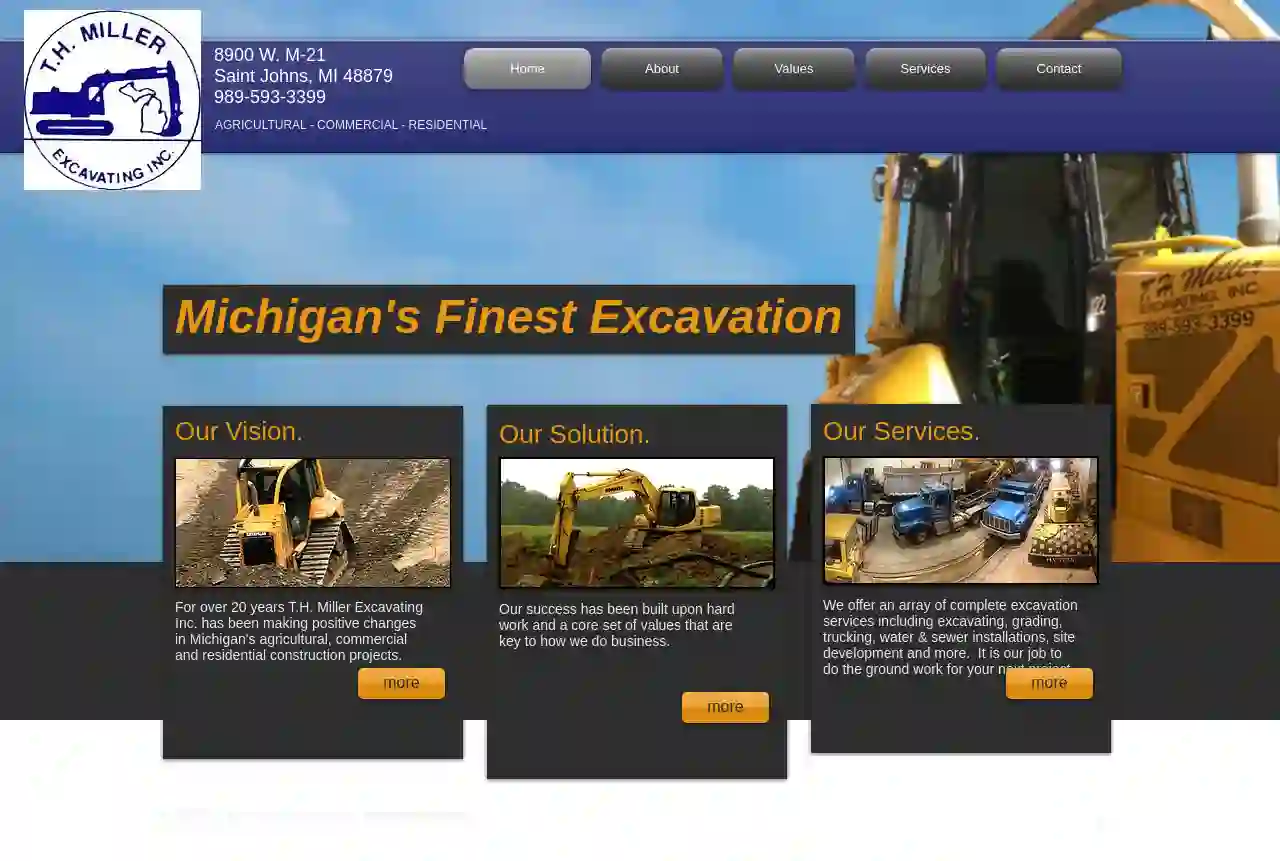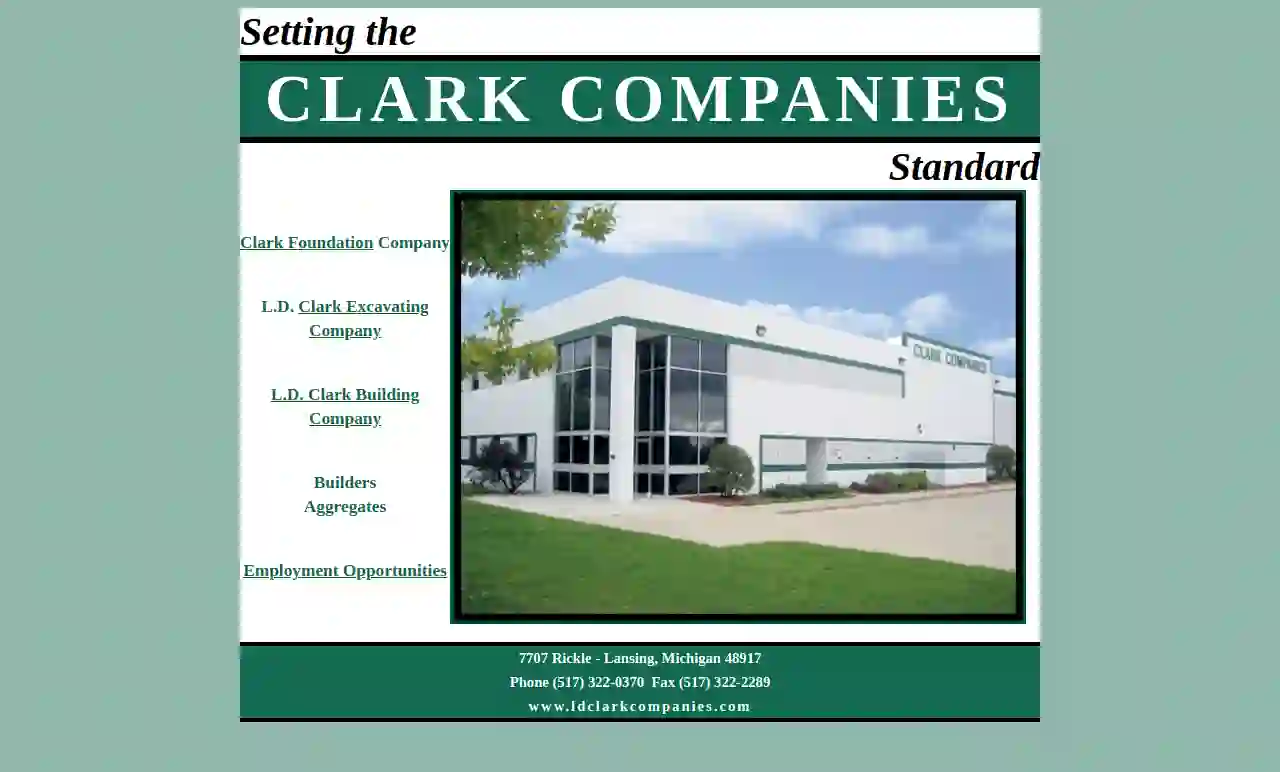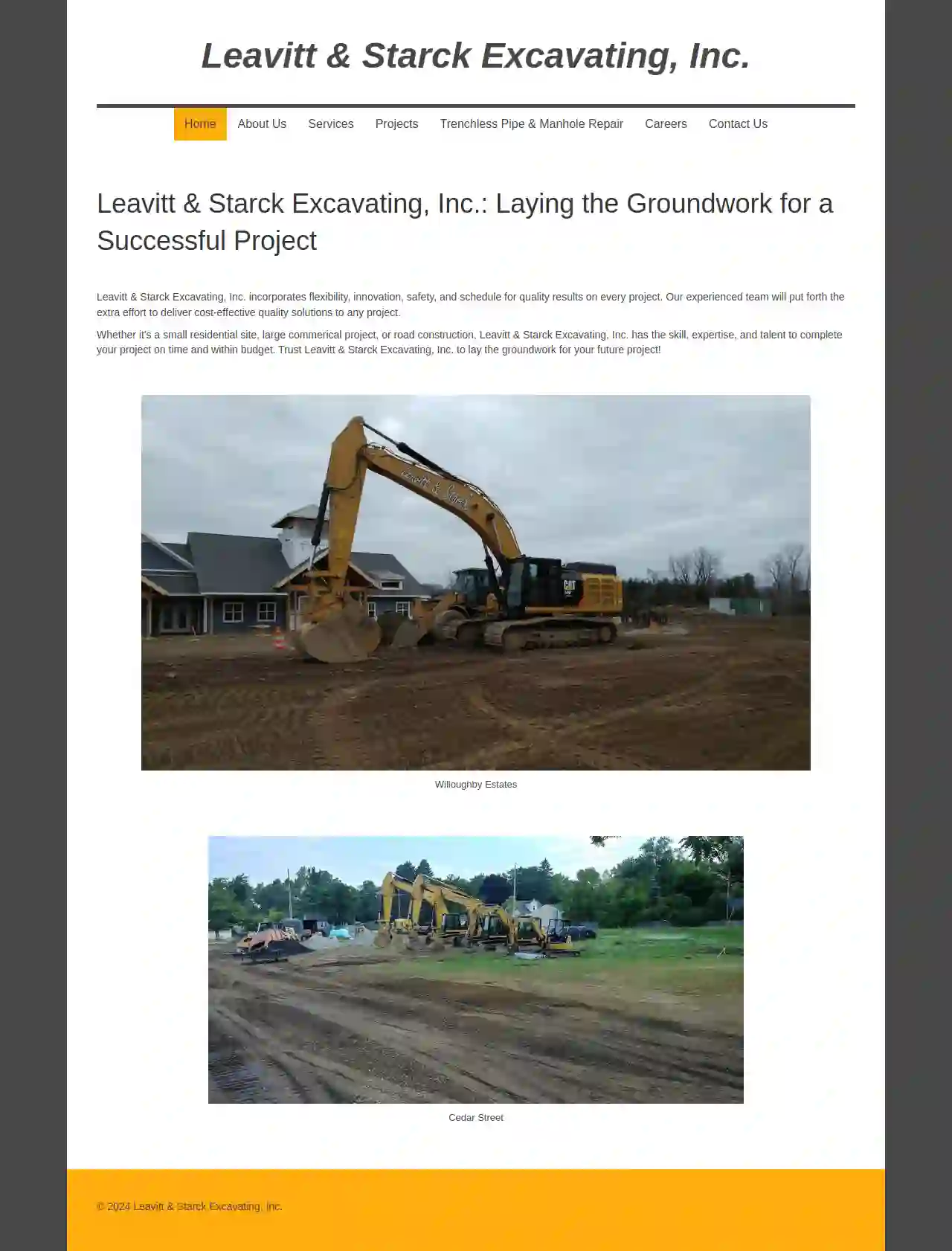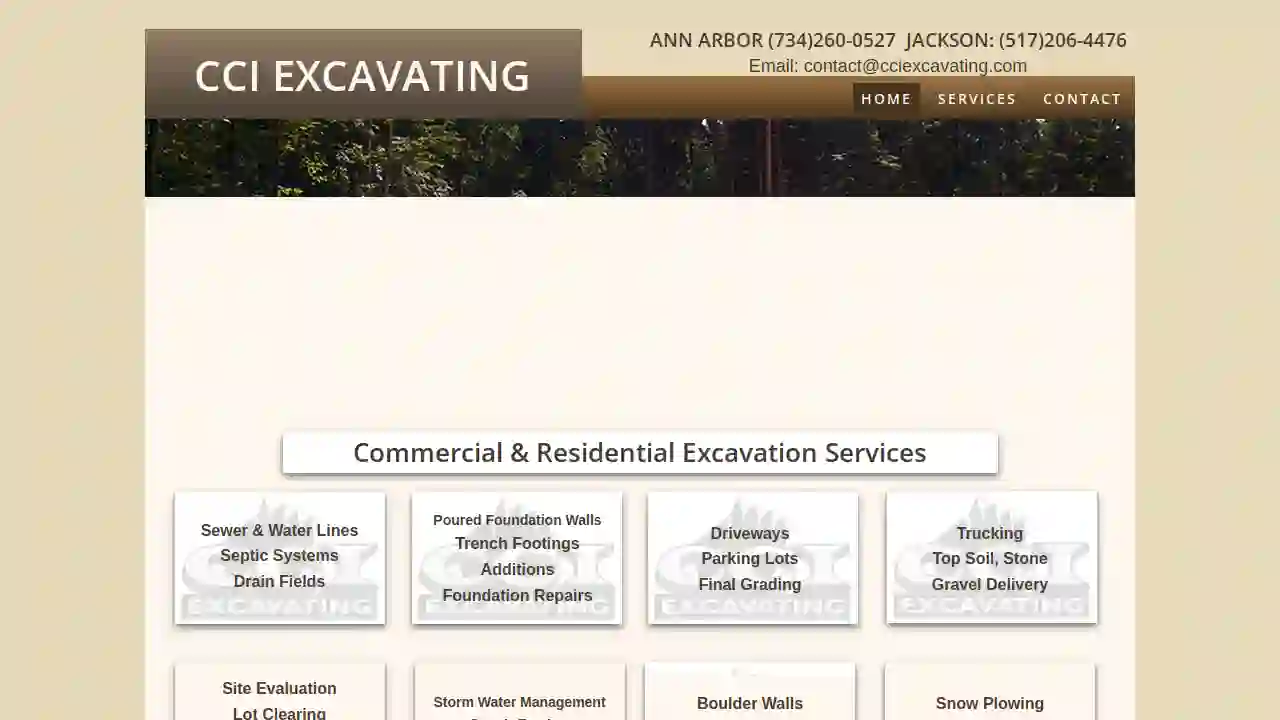Dirt Contractors Lansing
Top 10 Dirt Contractor in Lansing
Receive up to 3 Dirt Contractor quotes for your project today! Compare profiles, reviews, accreditations, portfolio, etc... and choose the best deal.

Miller T H Excavating, Inc.
4.913 reviewsLansing, US- Services
- Why Us?
Get Quote
L D Clark Excavating Co
4.33 reviews7707 Rickle, Lansing, 48917, USL.D. Clark Companies: Building Your Future L.D. Clark Companies is a family-owned and operated business with a rich history spanning over 40 years. Founded in 1975 by Larry Clark, our company has grown into a trusted name in the Lansing, Michigan area, known for its commitment to quality, integrity, and customer satisfaction. Our Mission Our mission is to provide our clients with exceptional construction services, exceeding expectations with every project. We strive to build lasting relationships with our customers, earning their trust through our dedication to excellence and unwavering commitment to their vision. Our Services L.D. Clark Companies offers a comprehensive range of construction services, including: Excavating Grading Trucking Foundation Building Aggregates Our Team Our team is comprised of experienced and dedicated professionals who are passionate about their craft. We believe in fostering a collaborative environment where every team member contributes to the success of each project. Our commitment to continuous learning and professional development ensures that our team remains at the forefront of industry best practices. Our Experience L.D. Clark Companies has a proven track record of delivering successful projects for both residential and commercial clients. We have a deep understanding of the local market and are committed to providing our clients with the highest quality construction services at competitive prices.
- Services
- Why Us?
- Testimonials
- Gallery
Get Quote
Hall's Trucking & Excavating
57 reviews13637 5 Mile Rd NE, Belding, 48809, USAbout Us We are a family owned and operated business! Denny Hall, owner, has been in the earth-moving business since 1995, and is fully licensed and insured for both Residential and Commercial work. We have company owned equipment which is well maintained. When choosing Hall's Trucking and Excavating, you can expect our great team to work hard on your behalf to get the job done! Our commitment to our customers is to maintain the highest level of quality and deliver cost efficient results without compromising service or safety! Contact Us Better yet, see us in person! We love our customers, so feel free to give us a call or email to set up a time to talk about your project.
- Services
- Why Us?
- Gallery
Get Quote
Simmons Excavating
4.825 reviewsLansing, US- Services
- Why Us?
Get Quote
Leavitt & Starck Excavating, Inc.
4.89 reviewsLansing, USLeavitt & Starck Excavating, Inc.: Laying the Groundwork for a Successful Project Leavitt & Starck Excavating, Inc. incorporates flexibility, innovation, safety, and schedule for quality results on every project. Our experienced team will put forth the extra effort to deliver cost-effective quality solutions to any project. Whether it's a small residential site, large commercial project, or road construction, Leavitt & Starck Excavating, Inc. has the skill, expertise, and talent to complete your project on time and within budget. Trust Leavitt & Starck Excavating, Inc. to lay the groundwork for your future project!
- Services
- Why Us?
- Gallery
Get Quote
Accuex Septic Excavating
538 reviews10551 Byron Rd, Howell, 48855, USAccuex Septic Excavating Over 25 Years of Experience Accuex Septic Excavating is a family-owned and operated business with over 25 years of experience in the septic industry. We are committed to providing our customers with the highest quality septic services at competitive prices. We offer a wide range of services, including septic installation, repair, and maintenance. We are also Eljen Certified, which means we are qualified to install and maintain Eljen septic systems. We are proud to serve the Howell, MI area. We are committed to providing our customers with the highest quality septic services at competitive prices. We offer a wide range of services, including septic installation, repair, and maintenance. We are also Eljen Certified, which means we are qualified to install and maintain Eljen septic systems. We are proud to serve the Howell, MI area.
- Services
- Why Us?
- Testimonials
- Gallery
Get Quote
C & H Underground - Excavation Company, Mini Excavator Services in Vermontville, MI
52 reviewsLansing, US- Services
- Why Us?
Get Quote- H
H & M Excavating LLC
518 reviewsLansing, US- Services
- Why Us?
- Gallery
Get Quote 
Mr. Digger Ponds and Excavating
51 reviewsLansing, US- Services
- Why Us?
Get Quote
CCI Excavating
57 reviewsLansing, US- Services
- Why Us?
Get Quote
Over 3,943+ Excavation Companies in our network
Our excavation contractors operate in Lansing & beyond!
ExcavationHQ has curated and vetted the Best Excavation Companies in Lansing. Find a reliable pro today.
Frequently Asked Questions About Dirt Contractors
- Large-Scale Excavation: Assessing soil conditions, designing slopes, and ensuring stability for large excavation projects.
- Foundation Design: Determining the appropriate foundation type and depth based on soil bearing capacity and other factors.
- Retaining Walls: Designing retaining walls to stabilize slopes, prevent erosion, or create level areas on sloped sites.
- Slope Stability Analysis: Evaluating the stability of slopes and recommending measures to prevent landslides or erosion.
- Contaminated Soil Remediation: Developing and implementing plans to clean up contaminated soil.
- Clearly Define Your Project Scope: Provide the contractor with detailed information about your project, including the size of the area, the type and volume of dirt needed, the desired grading or leveling, and any specific requirements.
- Obtain Multiple Quotes: Request quotes from multiple reputable dirt contractors to compare prices, services, and experience. Ensure the quotes are comprehensive and include all project details.
- Verify Licensing and Insurance: Confirm that the contractor has the necessary licenses, insurance coverage, and a good safety record. This protects you from potential liabilities.
- Communicate Openly and Regularly: Maintain open communication with the contractor throughout the project, addressing any questions, concerns, or changes promptly. Regular updates and site visits can help ensure everything is on track.
- Document Everything: Keep written records of all communication, contracts, quotes, and invoices for reference and accountability.
- **Good Drainage:** Allows excess water to drain away, preventing waterlogging and root rot.
- **Adequate Aeration:** Provides sufficient air pockets for root respiration.
- **Nutrient Retention:** Holds onto essential nutrients for plant uptake.
- **Easy to Work With:** Not too heavy or too light, making it manageable for digging and planting.
- Erosion Control: Berms can intercept and slow down runoff, preventing soil erosion and sedimentation.
- Noise Reduction: Berms can act as noise barriers, reducing noise pollution from traffic, construction, or industrial activities.
- Visual Screening: Berms can block unsightly views, create privacy, or define property boundaries.
- Security: Berms can serve as security barriers, deterring unauthorized access or vehicle intrusion.
- Landscaping: Berms can enhance landscaping by creating elevation changes, providing planting areas, or defining garden beds.
What is a soil engineer, and when might I need one?
What are some tips for working with dirt contractors?
What is the best type of dirt for my garden?
What is a dirt berm, and what are its uses?
What is a soil engineer, and when might I need one?
- Large-Scale Excavation: Assessing soil conditions, designing slopes, and ensuring stability for large excavation projects.
- Foundation Design: Determining the appropriate foundation type and depth based on soil bearing capacity and other factors.
- Retaining Walls: Designing retaining walls to stabilize slopes, prevent erosion, or create level areas on sloped sites.
- Slope Stability Analysis: Evaluating the stability of slopes and recommending measures to prevent landslides or erosion.
- Contaminated Soil Remediation: Developing and implementing plans to clean up contaminated soil.
What are some tips for working with dirt contractors?
- Clearly Define Your Project Scope: Provide the contractor with detailed information about your project, including the size of the area, the type and volume of dirt needed, the desired grading or leveling, and any specific requirements.
- Obtain Multiple Quotes: Request quotes from multiple reputable dirt contractors to compare prices, services, and experience. Ensure the quotes are comprehensive and include all project details.
- Verify Licensing and Insurance: Confirm that the contractor has the necessary licenses, insurance coverage, and a good safety record. This protects you from potential liabilities.
- Communicate Openly and Regularly: Maintain open communication with the contractor throughout the project, addressing any questions, concerns, or changes promptly. Regular updates and site visits can help ensure everything is on track.
- Document Everything: Keep written records of all communication, contracts, quotes, and invoices for reference and accountability.
What is the best type of dirt for my garden?
- **Good Drainage:** Allows excess water to drain away, preventing waterlogging and root rot.
- **Adequate Aeration:** Provides sufficient air pockets for root respiration.
- **Nutrient Retention:** Holds onto essential nutrients for plant uptake.
- **Easy to Work With:** Not too heavy or too light, making it manageable for digging and planting.
What is a dirt berm, and what are its uses?
- Erosion Control: Berms can intercept and slow down runoff, preventing soil erosion and sedimentation.
- Noise Reduction: Berms can act as noise barriers, reducing noise pollution from traffic, construction, or industrial activities.
- Visual Screening: Berms can block unsightly views, create privacy, or define property boundaries.
- Security: Berms can serve as security barriers, deterring unauthorized access or vehicle intrusion.
- Landscaping: Berms can enhance landscaping by creating elevation changes, providing planting areas, or defining garden beds.